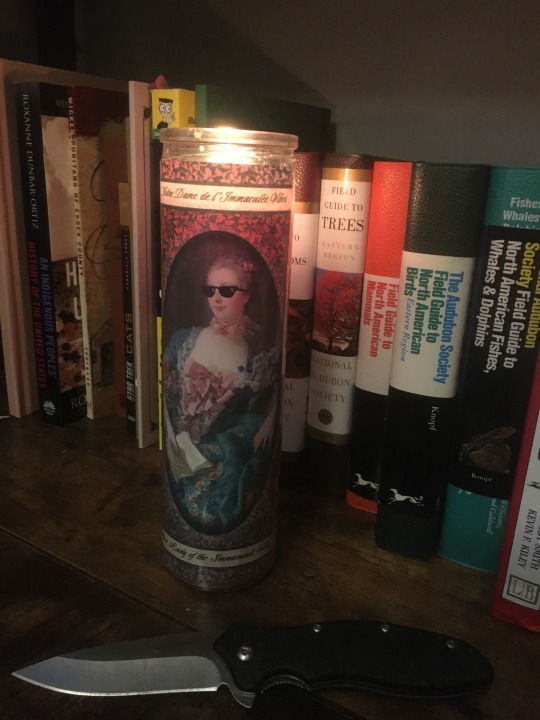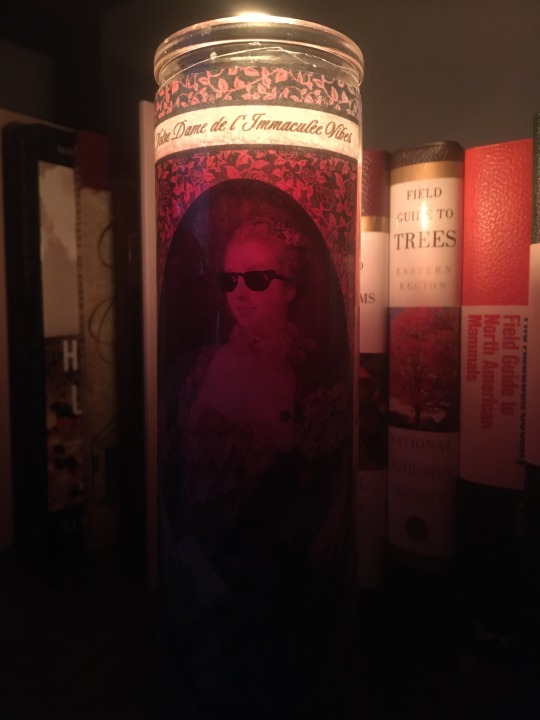#I know the noun goes before the adjective in French but I also don't know enough French to know when to distrust DeepL
Text


I made a thing
#Our Lady Of The Immaculate Vibes#madame de pompadour#18th century#votive candle#Catholic prayer candle vibes#bookshelf#don't think I haven't thumbed through the field guide to trees when writing my fics because I have#I know the noun goes before the adjective in French but I also don't know enough French to know when to distrust DeepL#And since this is a Title and not just an object?#my art
13 notes
·
View notes
Text


{10.01.23}
A very productive evening.
Won the Diamond Tournament.
French is coming along, at a intermediate level of competency, as it has been for almost as long as I can remember.
One of these days I will go back and actually learn the Dutch grammar that goes with the Dutch vocabulary.
I started learning Dutch because I completely burnt out on LSAT prep and my brain demanded to be learning something or, alternatively, suffer a complete collapse of uselessness.
(It was a whole thing.)
In the meantime, where slapdash French grammar won't suffice (I have YEARS of translation training with specific noun/adjective placements...we're not going to stop now), I'll just have to muddle through with the paid version of Duolingo that allows you to make all the mistakes without requiring you to take a time out to reflect on the travesty of your actions.
More Meaningful Productivity:
Completed LSAT Trainer Lesson 22
This was a Reading Comprehension lesson. Notably, the first in this book. It went really well. I like the approach here and feel like it might prove more helpful than other methods I've attempted. Looking forward to future lessons.
NLRB v. Jones & Laughlin Steel Corp. (1937) -- Reading Outline
United States v. Darby (1941) -- Reading Outline
I am reminded by these cases, about the concept of "plenary powers," and the first time I ever recall hearing said term being Liz speaking at a J6 Committee Hearing.
Intuitively feeling the importance of her words, wanting to fully understand, I looked it up.
If that wasn't the exact moment that I fell in love with both her AND Constitutional Law, it was a missed opportunity.
(It also concerns me about the state of education that I could have a college degree as well as an entire Master's degree and not know what a plenary power was -- but I haven't had a civics lesson since 7th grade. 🤷🏻♀️I vividly remember dropping APUSH because, at the time, it was World History that I'd really enjoyed and wanted more of. Psychology was the only advanced placement course I wasted time on Senior year. I didn't take the test...I don't know anyone that did. I did well in the class, but an official evaluation was a different story. Public schools are a mess. 🤦🏻♀️)
Currently Reading:
Law Man: Memoir of a Jailhouse Lawyer by Shon Hopwood
It's free on Kindle Unlimited. We got here because of the Plea Bargin book. The author of that book did nothing at all to endear this man to her readers. She made a valiant effort, but he's a pal of Jared Kushner and a member of the Federalist Society; it's a hard sell.
I wasn't expecting much. I was fairly certain I would end up rage!quitting before it was even worth mentioning.
Would love to know how much of it is ghostwritten...because, though it's still early (I'm in chapter 4), the story telling is actually very, very good.
How To Be Sort Of Happy In Law School by Kathryne M. Young
Author seems to think having studied Sociology along with Law gives her a unique and superior perspective.
I, too, have a degree in Sociology. It basically requires acceptance of reality/your surroundings, how we got here and how it perpetuates. It doesn't make you special.
I'm trying not to be too judgy. I really am. I've only gotten through the introduction and the first chapter...but I'm already feeling like, despite insistence that said book is for anyone with an interest in legal education, a non-traditional, part-time law student hopeful is just not the audience she's writing for.
For what it's worth, I do appreciate the research she's done and is reporting on. Survey is solid (save for the potential non-traditional gap). Sociological methods on point.
0 notes
Note
Hi! I'm very curious about something regarding the Spanish language. I'm currently studying A2 Spanish but I had this question and my teacher did not seem too willing to discuss it. Here it goes:
I know that Spanish has, something my Spanish teacher says, linguistic gender. I was wondering how do the people who don't align themselves with the gender binary (masculine and feminine) speak/write in it? I have read this article about Spanish speaking people from US adding "x" Or "@" and people from Argentina using "e" to make the words gender neutral.
Thank you so much for responding, whenever you get to it. Also love your blog. ❤
Short answer, in general speaking terms people are tending towards the -e now because the other two are very hard to actually speak, and because Spanish-speakers feel the -e is more authentic
What you're most likely to see in Spanish is masculine plural as the default, or in written things you might see todos y todas or like un/una alumno/a "a student", or like se busca empleado/a "employees wanted" / "looking for an employee"
If it's something official or academic you typically include both [todas y todas] or you go masculine plural [todos] unless it's specifically feminine plural
-
Related, linguistic gender applies to all things, not just people. Why is la mesa "table" feminine, but el libro "book" masculine? Just linguistic gender. I can tell you that most loanwords (that aren't people) in Spanish are masculine, and that there are certain words that come from Greek are masculine, and that -ista words are unisex most of the time... And I can tell you there are some words like testigo or modelo that are unisex and don't change for gender. Aside from that, speaking about nouns and grammatical gender... those particular things are harder to parse for regular people, but if you go into the field of linguistics you can explore that more deeply. Some of it is source language (i.e. "it came from Latin this way") or things like that. And in general when talking about nouns it's unimportant and not considered sexist, that's just how it is.
There is such a thing where it gets a little too far the other way and people will say "history? what about herstory" which is a nice thought but the etymology has nothing to do with gender there
When it comes to people - and when it comes to gendered attitudes - that's where it gets more confusing and more complicated.
I believe there was an experiment where people had French and Spanish speakers [I believe it was Spanish] try to identify how a "fork" would sound. French people gave it a more feminine voice because "fork" is feminine in French, while Spanish speakers gave it a more masculine voice because it's masculine in Spanish.
Whether we like it or not, certain gendered things do influence our thoughts and feelings and reactions. A similar thing in English exists where the old joke was something like "There was a car accident; a boy is rushed to the ER and the surgeon but the father was killed. When they got to the ER the doctor said 'I can't operate on him, he's my son!'" and it's like "well who could the doctor be?" ...and the doctor is his mother. We associate "doctor" as masculine and "nurse" as feminine.
There's a gender bias in our language thought patterns, even though the language changes. And that does exist in Spanish too, to different extents.
There are certain cultural and gendered stereotypes or connotations attached to certain words, many tend to be more despective or pejorative when it's women.
For example - and I know this has changed in many places or it isn't as prevalent - el jinete "horseman/rider", while the female form is la amazona "horsewoman/rider". Because la jinete or la jineta was sometimes "promiscuous woman".
There were also debates about things like la presidente vs. la presidenta or what the female version of juez should be, whether it should be la juez or la jueza
Most languages with gendered language have varying degrees of this, and all languages I'm aware of have gendered stereotypes related to professions or cultural attitudes in some way, and not just for women, and not all in the same way with some of them being very culturally based
-
The longer answer involves a bit of history, and I'll be honest, some of it is contested or considered a little controversial in Spanish-speaking countries particularly in the conservative parts (which honestly should come as no surprise)
The first symbol that I know of that came about was the X
First piece of contested history: As far as I know, it was the trans/queer and drag communities in Latin America who started the trend of X. When there were signs or bulletins that had the gendered endings - specifically masculine plural as the default plural - people would write a big X through the O. This was a way of being inclusive and also a very smash the patriarchy move.
Some people attribute this to women's rights activists which may also be true, but a good portion of the things I read from people say it was the trans/queer/drag communities in Latin America doing this.
I've also read it originated in Brazil with Portuguese; still Latin America, but not a Spanish-speaking country.
Where it's most contested is that some people will say that this trend started in the Hispanic communities of the United States. And - not without reason - people are upset that this is perceived as a very gringo movement.
That's why Latinx is considered a very American-Hispanic experience
-
The arroba (@) is relatively new. I remember seeing it in the 2000s. I don't know if it existed earlier for gender inclusivity.
People used it because it looks like a combination of O and A, so it was meant to be cut down on saying things like todos y todas or niños y niñas in informal written speech
I remember quite a few (informal) emails starting like hola tod@s or muy buenas a tod@s or things like that
I think of it more as convenience especially in the information age where you never knew who you were talking to and it's easier than including both words, especially when masculine plural might be clumsy or insensitive
Still, it's practically impossible to use the @ in spoken Spanish, so it's better for writing casually. You also likely won't be allowed to use the @ in anything academic, but in chatrooms, blogs, or forums it's an option
-
I love the E ending. And the gender neutral form in singular is elle... so it's él "he", ella "she", and elle "they (singular)"
The -e ending is I think became more common within the past 10 years though it might have existed longer than that. These sorts of changes tend to come from the queer or trans communities and tend to be more insular before becoming more of an outside thing that then the general population finds out about
It came about because there are some adjectives in Spanish that end in -e that are unisex. It's not an A, it's not an O, but it's something grammatically neutral for Spanish
It's not as awkward as X, and E exists very firmly in Spanish so it's not perceived as some outside (typically gringo) influence
The good news is, it's pretty widespread on the internet. Not so much in person (yet), but especially in Spain and Argentina at least from what I've seen, particularly in the queer communities and online culture.
The only issues with it are that for non-native speakers, you have to get used to any spelling changes. Like amigo and amiga, but to use the E ending you have to add a U... so it's amigue.
That's because there are certain words where you have to do spelling changes to preserve the sound; gue has a hard G sound like -go does [like guerra]... but ge has the equivalent of an English H sound [gelatina for example]. Another one is cómico/a "funny" which would go to cómique. Again, because co has a hard C/K sound, while ce is a soft sound more like an S or in some contexts TH/Z sound; like centro is a soft sound, while cola is a hard sound
Unless you make it to the preterite forms where you come across like pagué, alcancé, practiqué with those types of endings... or subjunctive forms, pague, alcance, practique ... Basically you'd have to be exposed to those spelling rules or you'd be really confused if you were a total beginner.
It all makes sense when you speak it, but spelling might be harder before you learn those rules
The other drawback is that the E endings are sometimes not applicable. Like in damas y caballeros "ladies and gentlemen" there's not really a gender neutral variation on that, it's all binary there. And while la caballero "female knight" does exist, you'd never see a male variation on dama; the closest I've ever seen is calling a guy a damisela en apuros "damsel in distress" in some contexts where the man needs rescuing, and it's feminine una/la damisela, and it's very tongue-in-cheek
There are also some contexts like jefe vs jefa where I guess you would say jefe for "boss" if you were going the neutral route, but it's a bit weird because it's also the masculine option.
I can't speak for how people might feel about those if they're non-binary or agender because every so often you kind of get forced into the binary whether you like it or not
I totally support the E, I just recognize there are some limitations there and it's quirks of the Spanish language itself
Important Note: Just to reiterate, E endings are the ones most Spanish-speakers prefer because it's easiest to speak and doesn't have the American connotation that X does in some circles
-
Where it gets very "Facebook comment section" is that you'll see many Latin Americans traditionalists and conservatives claim that "this is just the gringos colonizing our language" and "grammatical gender doesn't matter in Spanish". They'll say that the "gender movement" is an American feminist movement and that it's a gringo thing and doesn't reflect actual Latin Americans or Spanish-speakers
Which on the one hand, yes, English does have a lot of undue influence on other languages because of colonization, and American influence and meddling in Latin American politics is a big important issue
But as far as I'm aware of the X (and especially the E) were created by Latin Americans
The other issue I personally have is that any time this conversation comes up, someone will say something like somos latinOs and claim that masculine plural is gender neutral
To that I say, first of all, "masculine plural" is inherently gendered. Additionally, there is a gender neutral in Spanish but it's lo or ello and it's only used with "it" so it sounds very unfriendly to use on an actual person... and in plural it looks like masculine plural and everything applies like masculine plural
Second, the reason masculine plural is default is because of machismo. It's more important that we don't possibly misgender a man, so it has to be masculine plural. It's changed in some places, but growing up when I was learning Spanish, if it was 99 women and 1 man you still had to put masculine plural
I'm not opposed to there being a default, and I understand why it's easier to use masculine plural, but some people get very upset at the idea of inclusive language
...
In general, my biggest issues with these comments come when people act like non-binary/queer/trans people don't exist in Spanish-speaking countries, like English invented them somehow. So it's nice to see linguistic self-determination and seeing native speakers using the E endings.
103 notes
·
View notes